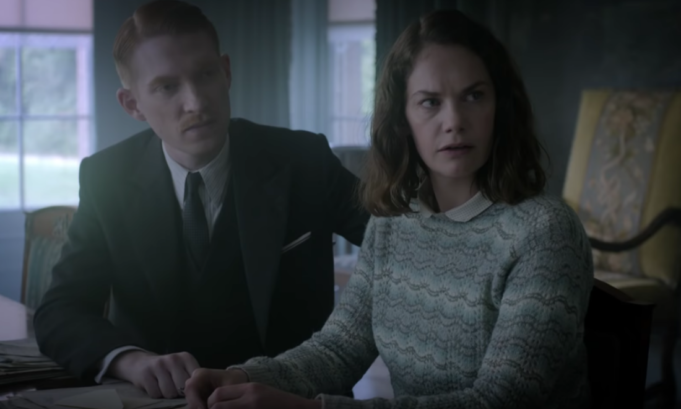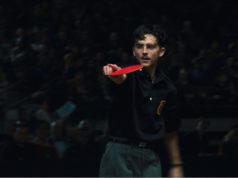Today’s topic is toxic masculinity. Wait, what am I saying? Our president is a man who bragged about sexually assaulting women, and as long as he’s in office, toxic masculinity will be the subject every damn day. Which is good for me — I went to an all-boys’ high school, and while any all-male environment will serve up some bad apples, an exclusive private school full of rich entitled boys will give you a banquet of them. We’ve got two movies opening this week that give us a look at different forms of noxious men, both based on British novels. Neither of them is wholly satisfying, but they’re interesting enough for me to write about.
The Little Stranger is Irish filmmaker Lenny Abrahamson’s follow-up to his Oscar-nominated Room, an English ghost story based on Sarah Waters’ novel. Domhnall Gleeson stars as Dr. Faraday, the son of servants at a great English country manor called Hundreds Hall who has grown up to be a doctor. In 1949, he’s called to Hundreds to tend to Roderick Ayres (Will Poulter), the young master of the house who came back from World War II a hero, but also shattered physically and mentally. While Faraday’s treating Roderick’s crippled leg, he finds himself falling for Roderick’s sister Caroline (Ruth Wilson) and fancying himself a savior for this aristocratic family fallen on poverty. Yet strange marks appear on the walls of the old house, bells start ringing themselves, and the much-loved family dog unaccountably turns vicious and mauls a little girl.
Despite the doctor’s rigid insistence that nothing supernatural is happening (even when it happens in his presence), it soon becomes clear that everything is emanating from Faraday himself. An aging bachelor who has shut himself down emotionally after the “hellish” experience of treating wounded soldiers in the war, his interior life is as bleak as his sparsely decorated apartment above his office. At his core is class envy, exacerbated by the fact that both Roderick and his mother (Charlotte Rampling) pull separate versions of the you’re-just-a-village-boy-how-dare-you-think-you’re-the-same-as-us? rant on him. Shortly thereafter, bad things happen to them. Faraday’s not really in love with Caroline as much as the prospect of gaining ownership of Hundreds Hall by marrying her, and when she starts to express desires of her own, he tells her she’s being irrational.
It’s unfortunate that Abrahamson doesn’t have a natural flair for horror. The only truly scary bit comes when Mrs. Ayres is locked in a long-empty child’s nursery and assailed by sounds and voices without any visible source. Gleeson can’t find the shading in this arrogant prig, and this material needs nothing less than a great performance in the lead role. (The acting honors are stolen away by Wilson, the sultry star of TV’s The Affair making herself look clumsy and antisocial.) What should have had the concentrated power of an Elizabeth Bowen short story comes off as a horror movie that’s too intellectual for its own good.
The Little Stranger
Starring Domhnall Gleeson and Ruth Wilson. Directed by Lenny Abrahamson. Written by Lucinda Coxon, based on Sarah Waters’ novel. Rated PG-13.

Altogether more enjoyable is Juliet, Naked, which is based on Nick Hornby’s novel. It takes place in an English coastal town where Annie (Rose Byrne) feels stuck running the local history museum that her father started. She has spent her last 15 years living with Duncan (Chris O’Dowd), a film and TV professor who, like many Hornby characters, is passionate about music. Unlike them, he’s let his passion tip over into trolldom — trollhood? trollicity? Anyway, he’s obsessed with Tucker Crowe, an American rock singer who made one album in 1993 called Juliet and then disappeared from public view. On the album’s 25th anniversary, the label puts out an EP of demos from it under the title Juliet, Naked, which Duncan proclaims as a masterpiece. A pissed-off Annie logs onto Duncan’s fan forum and mercilessly pans the album as a cynical cash grab, infuriating Duncan but garnering support from a minority of fans and, surprisingly, from Tucker himself (Ethan Hawke), who emails her to say she was right.
Duncan is a classic music troll who won’t hear anything against his idol and launches an angry screed at Rolling Stone for ranking Juliet at only No. 43 on its list of top 50 breakup albums. He romanticizes Tucker as a lost, tortured genius when, in fact, Tucker’s an unemployed recovering addict who lives off the charity of one of his ex-wives and has a trail of kids whom he barely knows. When Tucker stops by on a visit to the U.K. to see Annie, Duncan initially refuses to believe that the burnout case in front of him is his musical hero. He lets his fandom drive a wedge between him and Annie, as he tells her, “I don’t want to spend my time with someone who doesn’t get it.” On the other hand, when Tucker disillusions him by calling Juliet a piece of shit, Duncan isn’t wrong when he answers that a work of art’s meaning to its fans carries more weight than its meaning to its creator. O’Dowd’s charm keeps Duncan from becoming unbearable, yet you can’t help but feel the movie misses its chance to nail down this type of fan with the kind of rancor that he deserves.
If we heard more of Juliet in the film, it would help us judge who’s right in the movie’s ongoing musical debate. Alas, we must go online for that, and while the songs done up in an appropriate early-’90s style are by the likes of Conor Oberst, M. Ward, and Robyn Hitchcock, the only one I found myself caring for is the spooky, reverb-filled “20th Call of the Day,” penned by Ryan Adams. As it is, the only musical moment in the film that convinces us that these people are arguing over something worthwhile is when Tucker gets pressured into performing at Annie’s museum and, instead of doing one of his own songs, covers “Waterloo Sunset.” The romantic plot, as Annie tries to decide whether to leave Duncan for Tucker, is pleasingly resolved but doesn’t generate the tension that’s needed here. The writing here is strong enough to make Juliet, Naked into a pleasing late-summer trifle. With more bite, it could have been truly memorable.
Juliet, Naked
Starring Rose Byrne, Ethan Hawke, and Chris O’Dowd. Directed by Jesse Peretz. Written by Evgenia Peretz, Jim Taylor, and Tamara Jenkins, based on Nick Hornby’s novel. Rated R.












